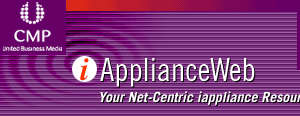



 |
 |
|
|
 |

|
||
|
|
|
|
|||

|
MPEG-4 licensors add a 'use fee'By SAN MATEO, Calif. The agency that licenses MPEG-4 video digital compression technology has lowered royalties but imposed an unprecedented "use fee" for disseminating the video data. MPEG LA LLC, which represents 18 owners of essential MPEG-4 patents, said Thursday (Jan. 31) that manufacturers of end products like cell phone handsets, set-top boxes and DVD players that feature MPEG-4 video decoding or encoding, either in hardware or software, must pay royalties of 25 cents per decoder or encoder up to $1 million per year per legal entity. Those rates are far lower than the current royalty for MPEG-2 video licensing: $2.50 per decoder, encoder or codec. The royalties were reduced recently from $4 per decoder or encoder and $6 per codec. But controversy is expected to swirl around the unprecedented use fee that service providers will be charged. "It will be paid by entities that disseminate MPEG-4 video data," said Larry Horn, vice president of licensing and business development at MPEG LA. While the industry was seen as generally welcoming the lower royalties for MPEG-4 video decoders and encoders, some service providers, Hollywood studios and other content owners were said to be unhappy with the so-called use fee. The use fee is set at $0.00033 per minute equivalent to 2 cents an hour based on playback or normal running time for every stream, download or other use of MPEG-4 video data for which a viewer pays the provider or content owner. When MPEG-4 is used for a packaged medium, such as DVDs, the royalty rate to be paid by replicators is also 2 cents per hour. Tough tracking But unlike the straightforward job of tracking MPEG-4 video streaming or downloading over the Internet, broadcasters using MPEG-4 video compression to beam programs will be hard put to tell how many people "played back" the content. MPEG LA is studying the issue, Horn said. He said the goal of the new MPEG-4 video licensing structure was to provide what he called "a fair price point" shared by a broader range of users. "Given the technology, which is very dynamic and deployed in more difficult environments such as the Internet or mobile communications, it's fair to say that MPEG-4 was a difficult technology [to develop]," said Horn. "We think we've done our best to balance different interests." In hopes of pushing MPEG-4 further in the market, licensors will give licensees a one-year grace period after making their MPEG-4 video licenses available on the market. Licensees will be forgiven their payment of royalties for all MPEG-4 video products during that year, Horn said. The 18 companies identified by MPEG LA as essential intellectual-property holders in MPEG-4 video include some of the major players in consumer electronics, such as Canon, Hitachi, JVC, Matsushita, Mitsubishi, Philips, Samsung, Sanyo, Sharp, Sony and Toshiba. New to the MPEG patent pool are Hyundai, Microsoft, Oki and Telenor. France Telecom, Fujitsu and KDDI are also owners of essential patents for MPEG-4 video. Rob Koenen, president of the MPEG-4 Industry Forum, said that although he is not yet familiar with the details of MPEG-4 licensing, he is "glad that finally things are clear." Koenen said he is looking forward to "an open debate in the industry" to see if the new structure is the right model for MPEG-4. Representatives of the Internet Streaming Media Alliance, one of the initial users of MPEG-4-based video-streaming technology, declined to comment. |
|
||||||||

Terms and Conditions Privacy Statement |
||||||||||